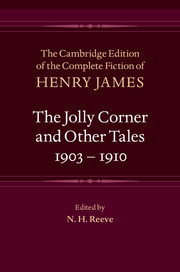Book contents
- Frontmatter
- Contents
- Acknowledgements
- List of Abbreviations
- General Editors’ Preface
- General Chronology of James’s Life and Writings
- Introduction
- Textual Introduction
- Chronology of Composition and Production
- Bibliography
- The Jolly Corner and Other Tales 1903–1910
- Glossary of Foreign Words and Phrases
- Notes
- Textual Variants
- Emendations
- Appendices
II
Published online by Cambridge University Press: 11 April 2021
- Frontmatter
- Contents
- Acknowledgements
- List of Abbreviations
- General Editors’ Preface
- General Chronology of James’s Life and Writings
- Introduction
- Textual Introduction
- Chronology of Composition and Production
- Bibliography
- The Jolly Corner and Other Tales 1903–1910
- Glossary of Foreign Words and Phrases
- Notes
- Textual Variants
- Emendations
- Appendices
Summary
What he had first felt, of course, was the rare coolness of it, the almost impudent absence of any tone of responsibility; which had begun by seeming to make the little painter-man's own case as “rum,” surely, as one could imagine it. He had gone, poor troubled Traffle, after the talk, straight to his own studio, or to the rather chill and vague, if scrupulously neat, pavilion at the garden-end, which he had put up eight years ago in the modest hope that it would increasingly inspire him; since it wasn't making preparations and invoking facilities that constituted swagger, but, much rather, behaving as if one's powers could boldly dispense with them. He was certain Jane would come to him there on hearing of him from the parlour-maid, to whom he had said a word in the hall. He wasn't afraid—no—of having to speak a little as he felt; but, though well aware of his wife's impatience, he wasn't keen, either, for any added intensity of effort to abound only in Mrs. Traffle's sense. He required space and margin, he required a few minutes’ time, to say to himself frankly that this dear dismal lady had no sense—none at least of their present wretched question—that was at all worth developing; since he of course couldn't possibly remark it to poor Jane. He had perhaps never remarked for his own private benefit so many strange things as between the moment of his letting himself again into the perpetually swept and garnished temple of his own perfunctory aesthetic rites, where everything was ready to his hand and only that weak tool hung up, and his glimpse of Jane, from the smaller window, as she came down the garden walk. Puddick's studio had been distinctly dirty, and Puddick himself, from head to foot, despite his fine pale little face and bright, direct, much more searching than shifting eyes, almost as spotty as the large morsel of rag with which he had so oddly begun to rub his fingers while standing there to receive Mora's nearest male relative; but the canvas on his easel, the thing that even in the thick of his other adventure was making so straight a push for the Academy, almost embarrassed that relative's eyes, not to say that relative's conscience, by the cleanness of its appeal.
- Type
- Chapter
- Information
- The Jolly Corner and Other Tales, 1903–1910 , pp. 266 - 273Publisher: Cambridge University PressPrint publication year: 2017

